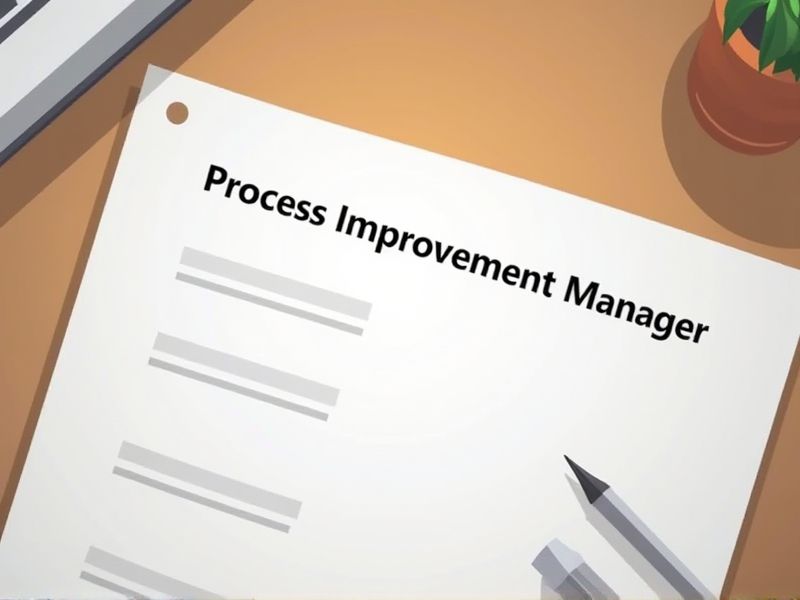
The role of a Process Improvement Manager centers on optimizing operational workflows to enhance efficiency and quality, demanding a keen understanding of project management, quality control, and lean methodologies. Certifications equip managers with standardized knowledge and skills, ensuring they can effectively implement strategies such as Six Sigma or Lean principles. Having certifications also provides credibility, assuring stakeholders of the manager's expertise in driving process enhancements. Some crucial certifications that may be required for a Process Improvement Manager include Lean Six Sigma Green Belt, Certified Kaizen Facilitator, and Project Management Professional.
Lean Six Sigma Green Belt Certification
Earning a Lean Six Sigma Green Belt Certification equips a Process Improvement Manager with essential tools and methodologies for identifying inefficiencies. This certification strengthens their ability to implement data-driven strategies that minimize waste and improve quality. The structured problem-solving approach provided by Lean Six Sigma enhances their capability to drive impactful changes within organizations. Possessing this certification often increases a manager's credibility and aligns them with industry standards, facilitating better communication and collaboration across teams.
Lean Six Sigma Black Belt Certification
Lean Six Sigma Black Belt Certification equips a Process Improvement Manager with advanced analytical skills to efficiently identify and address inefficiencies in operations. The rigorous training ensures they can lead complex projects and drive significant cost reductions within the organization. This credential validates their expertise in both Lean methodologies and Six Sigma principles, making them more credible to stakeholders and leaders. By obtaining this certification, a manager significantly enhances their ability to facilitate continuous improvement culture and deliver consistently high-quality outcomes.
Certified Manager of Quality/Organizational Excellence (CMQ/OE)
A Certified Manager of Quality/Organizational Excellence (CMQ/OE) is necessary for a Process Improvement Manager because it provides a comprehensive understanding of quality management principles, which are essential for systemic enhancement. CMQ/OE equips managers with skills in leadership, strategic planning, and managing team dynamics, crucial for driving process improvements effectively. This certification validates a manager's ability to leverage data for informed decision-making, ultimately enhancing operational efficiency. Having this certification can also increase organizational confidence in a manager's capability to handle complex process improvement initiatives successfully.
Project Management Professional (PMP)
Project Management Professional (PMP) certification provides a structured framework that enables Process Improvement Managers to streamline workflows effectively. With PMP, managers gain skills in risk management and resource allocation, crucial for identifying process inefficiencies. The certification enhances the ability to communicate project goals and progress clearly, fostering better team collaboration. PMP's focus on performance metrics allows managers to track improvements accurately, ensuring continuous process optimization.
Agile Certified Practitioner (PMI-ACP)
Gaining the Agile Certified Practitioner (PMI-ACP) certification equips a Process Improvement Manager with a comprehensive understanding of agile practices, fostering flexibility in process adaptation. The certification enhances the manager's ability to lead cross-functional teams effectively, which is crucial for implementing continuous improvement initiatives. As agile methodologies emphasize responding to change and delivering customer value quickly, the PMI-ACP credential aligns closely with the objectives of process improvement. A Process Improvement Manager with PMI-ACP certification can leverage agile frameworks to streamline workflows, remove inefficiencies, and increase overall organizational agility.
Certified Quality Improvement Associate (CQIA)
A Process Improvement Manager focuses on analyzing and enhancing business processes to increase efficiency and quality. A Certified Quality Improvement Associate (CQIA) provides foundational knowledge in quality principles and tools, essential for identifying and implementing process enhancements. CQIA certification equips managers with capabilities in understanding quality concepts crucial for sustaining improvements. This certification aids in fostering a culture of continuous improvement, aligning with organizational goals and customer satisfaction metrics.
Business Process Management (BPM) Certification
Business Process Management (BPM) Certification provides a structured understanding of process analysis and optimization, which is essential for a Process Improvement Manager aiming to streamline operations. Certification equips managers with methodologies and tools recognized globally, enhancing their ability to drive efficiency and foster innovation within organizations. The curriculum covered in BPM certification helps managers to identify and eliminate bottlenecks, consequently improving process efficiency and effectiveness. Employers often value certification as it signifies a commitment to the profession and a standardized level of competency in managing and improving business processes.
Kaizen Certification
Kaizen Certification equips a Process Improvement Manager with the necessary tools to identify and eliminate waste effectively, enhancing efficiency. This certification ensures the manager is adept at fostering a culture of continuous improvement among team members, thereby driving consistent progress. It provides structured methodologies for problem-solving, which are crucial for sustaining long-term improvements. Organizations value this expertise, as it directly correlates to enhanced productivity and competitiveness.
Lean Management Certification
Lean Management Certification equips a Process Improvement Manager with tools to identify and eliminate waste, which enhances operational efficiency. It provides a structured approach to continuous improvement, ensuring better workflows and quality. The certification fosters a mindset of value-driven thinking, aligning projects with customer needs and organizational goals. Holding this certification signals expertise and commitment, boosting credibility in leading transformative initiatives.
Certified Business Process Professional (CBPP)
The CBPP certification equips Process Improvement Managers with standardized methodologies, which leads to more effective process optimization. Holding a CBPP enhances credibility, thus fostering trust among team members and stakeholders. The credential demonstrates a thorough understanding of best practices, enabling managers to identify inefficiencies accurately. As organizations increasingly prioritize process excellence, CBPP-certified managers often find greater career advancement opportunities.
Summary
You can expect enhanced managerial effectiveness by earning certifications as a Process Improvement Manager. Certifications often lead to a deeper understanding of advanced methodologies and tools, enabling you to identify inefficiencies more accurately. This expertise can result in streamlined processes, reduced costs, and improved quality. You also gain increased credibility, which can facilitate leadership roles and better collaboration with stakeholders.
